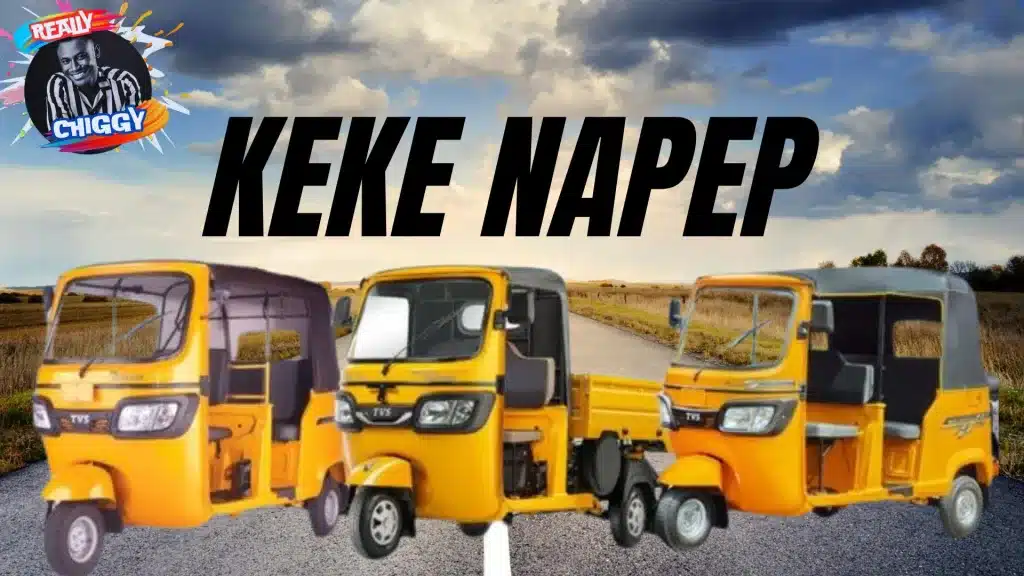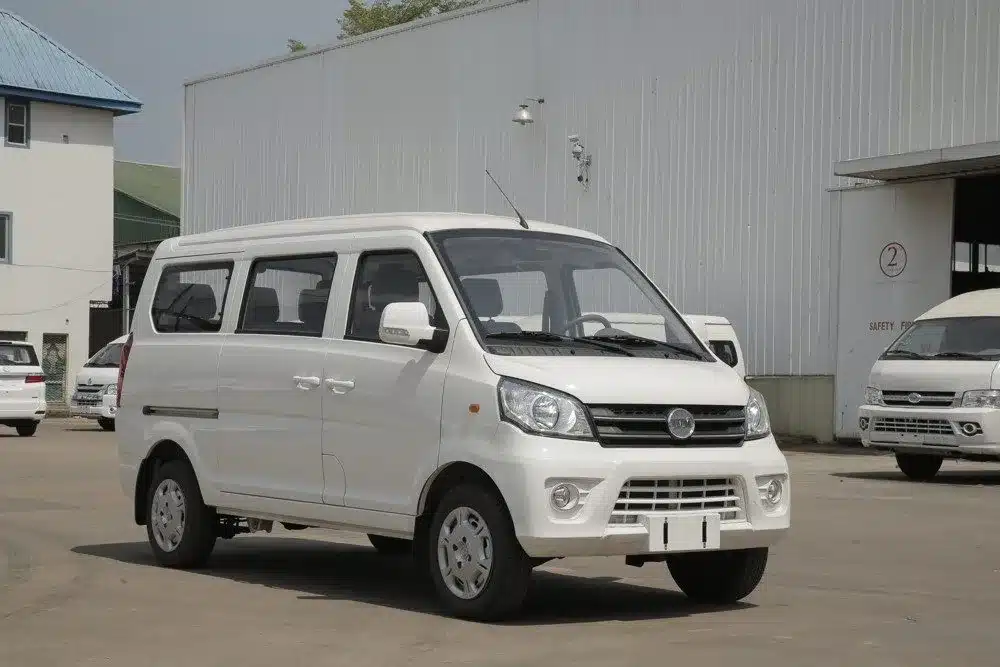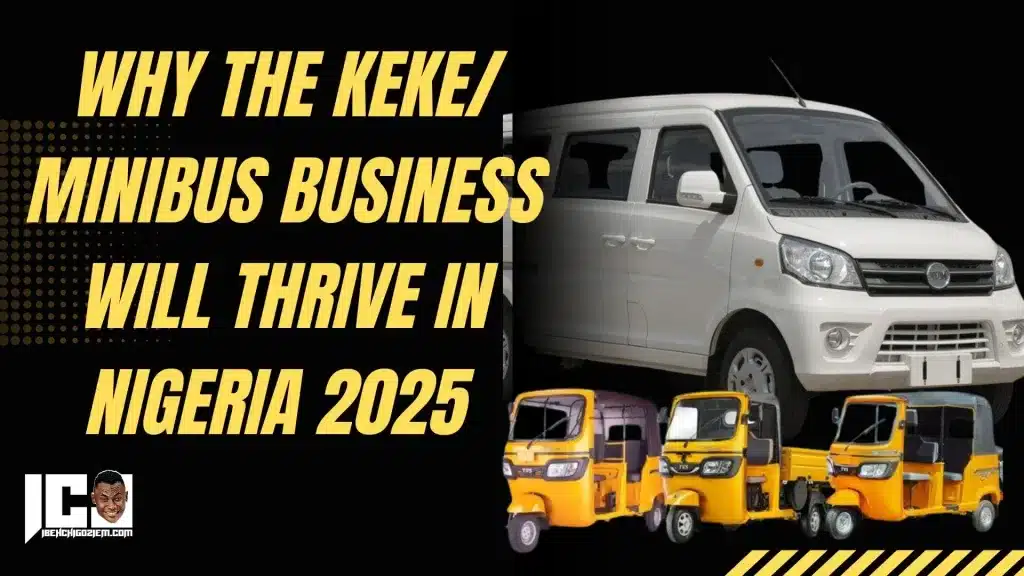Why The KeKe/ MiniBus Business Will Thrive in Nigeria 2025
The word Keke bus refers to an autorickshaw minibus of 7-seaters or motorized tricycles. It’s a common and affordable mode of transportation in Nigerian towns, cities, and villages. However, the KEKE bus is referred to as “keke napep” in some parts of Nigeria.
The word Keke NAPEP is a combination of two words which is a Yoruba word and an acronym of an empowerment program. The Yoruba word “keke,” means bicycle, and “NAPEP,” which stands for National Poverty Eradication Program, are the origins of the phrase “keke-NAPEP.” Since using motorbikes for business purposes is dangerous and against the law, the keke-NAPEP is used as a commercial vehicle.
Most Nigerians now give more appreciation to the government for the introduction of the Keke bus into the Nigerian transportation system.
ALSO, READ Top 10 Affordable Cars To Buy In 2024
The introduction of the Keke bus has given many young people without jobs and education a source of income.
Hence, the rate of robbery and cultism has somewhat decreased due to the fact that the majority of individuals in Nigeria now have a means of income and livelihood.
Origin of Keke NAPEP?

It is true that tricycles have been in existence for a very long time but the existence of the word Keke NAPEP can be traced back to Nigerian Government efforts to address poverty and improve transportation systems in the early 2000s.
Keke-NAPEP was introduced under the National Poverty Eradication Programme (NAPEP), a federal government initiative aimed at reducing poverty and unemployment in the country.
The program can be said to be successful because it metamorphosed into a big business opportunity for many Nigerians as well as employment opportunities for many.
Today, Keke NAPEP has evolved beyond its origin as a government initiative and remains a vital part of Nigeria’s transportation system, particularly in urban and semi-urban areas creating a wider range of opportunities for Nigerians.
This opportunity ranges from job creation to business opportunity in many aspects; Keke-NAPEP mechanics, assemblers, riders, dealers, importers of Keke-NAPEP spare parts etc. In short, it is a good business to venture into. You can pick one of its aspects and invest in it.
Importance of Keke NAPEP/ Mini-Bus to the transportation sector

Transportation is among the more vital economic activities for a business as most business requires movement of goods and some services from one location to another.
Hence, transportation is the means of carrying people, goods and services from one place to another and this has become very important in each stage of human civilization.
It is unarguable that transportation has contributed much to the development of economic, social, political and cultural fields and uplifting their condition.
Generally, the world wouldn’t have experienced Speedy industrialization without the development of the transportation system which Keke NAPEP has a great impact on.
It is true that there are numerous investment opportunities in the transportation business especially with the introduction of Keke NAPEP which you can avail yourself of the opportunities in order to solve transportation problems in Nigeria as well as make good money for yourself.
You should be aware that the transportation business in Nigeria guarantees a lot of cash back for investors. More so, the increase in the Nigerian population has posed a problem for people moving from one place to another due to the ban on Okada (Business Motorcycle) resulting in an increase in demand for transportation business in Nigeria.
ALSO, READ Top 10 Fastest Selling Cars In Nigeria (With Specs)
Transportation problems are more than enough in some states such as Lagos, Kano, and Onitsha among others that have large populations for the few transportation businesses in the country to solve daily, a good number of Nigerians desire the services of transportation business operators and are largely depended on commercial transport operators specifically Keke NAPEP Operators to get to where they are working or doing businesses, including students who are going to schools.
Keke Bus is another area of investment in the transportation business in Nigeria; Tricycles are commonly accessed, affordable and patronized by lower-class members of society.
Although tricycles travel short distances and are mostly within cities, just like taxi cabs, the number of passengers carried by keke is lesser than other means of transportation (commercial taxis, commercial buses).
The merit of tricycles over other means of road transportation, it is convenient and can travel through narrow roads making them a great choice for most people.
This reveals that the transportation business is a lucrative business especially Keke NAPEP which is the best choice for commuters.
Reasons to invest in Keke NAPEP/ Minibus business in 2025
The Keke-NAPEP business has the potential to thrive in Nigeria in 2025 due to several socio-economic, and infrastructural factors and due to the fact that many federal and state government policies give room to Keke NAPEP to thrive in Nigeria.
1. Ban on the use of Okada (business motorcycles)
One of the reasons that will make Keke NAPEP thrive in 2025 is the ban on Okada (business motorcycles) in major towns. For instance, many state governments have banned the usage of Okada (business motorcycles) in most of the state capital as well as the main town of the state, hence there is a great demand for the transportation of passengers back and forth which will result in greater opportunity for Keke Bus to thrive in 2025.
2. Keke NAPEP is less expensive to maintain
Another reason why Keke NAPEP will thrive in 2025 is the fact that Keke NAPEP is less expensive both for commuters and operators than other forms of transportation, it is currently the most popular form of street transportation in the nation, not only because it is less expensive but due to the fact that it can easily navigate through a narrow area. Hence most commuters prefer boarding Keke NAPEP to other means of road transportation.
3. Government Policies support Keke NAPEP
The prospect of Keke NAPEP business in 2025 is very high due to the Nigerian government’s plan to give more support to the tricycle sector, by planning to increase the use of tricycles through the introduction of solar-powered Keke Napep which will function more on electricity than fuel. As a result, it is right to conclude that starting a tricycle business is a viable business idea in 2025.
10 reasons why Keke Bus (Keke NAPEP) Business will thrive in 2025

Here are other reasons Why the KeKe Bus Business Will Thrive in Nigeria in 2025. Aside from the 3 reasons listed above, other reasons are explained below to make you see the need to invest in this business in 2025 for higher profit.
- High Demand for Affordable Transportation
- Versatility in Navigating Traffic
- Accessibility in Rural Areas
- Job Creation
- Low Initial Investment
- Government Policies
- Growing Urbanization
- Fuel Efficiency
- Cultural Acceptance
- Entrepreneurial Opportunities
1. High Demand for Affordable Transportation
The high demand for affordable transportation is driven by the need for cost-effective mobility solutions in growing urban and peri-urban areas.
This is because as populations expand and cities face increased pressure on their transportation systems, commuters seek reliable, accessible, and budget-friendly options to meet their daily movement needs.
This demand is particularly significant in regions with limited access to formal public transport or where income levels make expensive alternatives unsustainable.
Affordable transportation options, such as Keke buses, thrive in this kind of environment by offering low fares, flexible routes, and frequent services.
Their smaller size allows them to easily navigate congested streets and access hard-to-reach areas, making them ideal for short-distance trips.
For many commuters, these services provide a crucial link to workplaces, schools, markets, and other essential destinations.
Moreover, the economic benefits of affordable transport extend beyond passengers. They create opportunities for small-scale entrepreneurship, as individuals can own and operate the Keke bus, contributing to local economies.
With rising urbanization, the gap between transportation demand and supply continues to grow, making affordable solutions essential.
Keke bus provides a cost-effective means of transportation for the average Nigerian, especially in densely populated cities where public transport options are limited.
Also, the fares of the Keke bus are cheaper compared to taxis or Uber services, making them accessible to a large portion of the population.
By addressing the needs of cost-conscious commuters, affordable transportation options like Keke buses are positioned to play a vital role in improving mobility and fostering economic inclusion.
2. Versatility in Navigating Traffic
Versatility in navigating traffic is a key advantage that makes Keke buses highly effective in urban and peri-urban areas.
Traffic congestion is a common issue in many big cities, often causing delays and inconvenience for commuters.
Therefore the ability of smaller, more agile vehicles to maneuver through crowded streets and bypass gridlocks is invaluable in such environments.
ALSO, READ 10 Best Electric Car Brands In Nigeria 2024
Keke-NAPEP, with its compact design, can easily navigate narrow roads, crowded neighbourhoods, and areas inaccessible to larger vehicles.
This flexibility allows them to operate in both high-density urban centres and remote locations where conventional buses and cars struggle.
Their ability to weave through tight spaces and find alternative routes ensures faster travel times, even during peak traffic hours.
This versatility also enhances their efficiency and reliability, as they can maintain consistent schedules despite challenging traffic conditions.
For commuters, this means less time spent in transit and greater confidence in reaching their destinations on time.
By effectively addressing the challenges posed by traffic congestion, Keke buses play a vital role in improving urban mobility, reducing commuter stress, and enhancing the overall transportation experience.
3. Accessibility in Rural Areas
Another reason why Keke bus will thrive in 2025 is its accessibility in rural areas which is a critical factor in ensuring that communities remain connected to essential services, economic opportunities, and social networks.
Many rural regions face challenges such as poor infrastructure, unpaved roads, and limited access to formal transportation systems. Affordable and versatile transport solutions, such as Keke buses, play a vital role in bridging this gap.
The compact size and durability of Keke buses make them ideal for navigating narrow, uneven, or poorly maintained rural roads. Unlike larger vehicles, they can reach remote locations that are often underserved by traditional public transportation.
This accessibility ensures that rural residents can travel to markets, schools, healthcare facilities, and neighbouring towns with greater ease and reliability.
Keke buses also offer a cost-effective option for rural commuters who may not afford private vehicles or higher-priced transport services.
Their affordability helps reduce transportation barriers, fostering economic activity and improving the quality of life in rural areas where farming is the main source of likelihood. Farmers, for instance, can transport goods to markets more conveniently.
4. Job Creation
Job creation is a significant benefit of Keke buses and this will make it a successful business in 2025 and beyond.
Keke bus operations generate employment opportunities for drivers, mechanics, and other support services such as dispatchers and fare collectors.
Entrepreneurs can invest in owning and managing fleets, creating small business ventures that stimulate local economies.
The industry also supports indirect jobs, including fuel station attendants, spare part vendors, and vehicle manufacturers.
By offering sustainable livelihoods to many individuals, particularly in areas with limited formal employment, Keke NAPEP contributes to poverty reduction and economic empowerment. This ripple effect strengthens communities and promotes overall economic development giving it a chance to thrive well in 2025.
5. Low Initial Investment
The low initial investment is one of the primary reasons why Keke NAPEP is attractive to entrepreneurs and operators.
Unlike traditional buses or larger vehicles that require substantial capital to purchase, Keke buses are significantly more affordable, making them accessible to small-scale investors and individuals seeking to start a business.
This affordability lowers the barrier to entry for people looking to participate in the transportation industry, fostering entrepreneurship and economic growth.
The reduced cost of acquiring Keke buses compared to other commercial buses is complemented by lower maintenance and operational expenses.
Its compact design and efficient engines mean they consume less fuel and require fewer repairs compared to larger vehicles. This ensures that operators can keep operating costs manageable while maximizing profits.
For aspiring business owners, the low initial investment makes it possible to start small and gradually expand by reinvesting profits.
This scalability is particularly appealing in developing regions where financial resources may be limited. Moreover, the affordability of Keke buses also encourages partnerships or financing opportunities, enabling more individuals to enter the transportation sector.
6. Government Policies
Government policies play a crucial role in determining the success and sustainability of any transportation system and the Keke bus has the blessings of the Nigerian Government as against commercial motorcycles which have been banned by the government of many states.
Supportive government policies can enhance the growth of this sector by providing a conducive environment for operators, investors, and passengers.
These policies often address key aspects such as regulation, safety, infrastructure development, and economic incentives such as.
1. Regulatory Framework
There are clear and well-structured regulations put in place by the government to ensure that Keke buses operate efficiently while maintaining safety standards.
Licensing systems for drivers, vehicle inspections, and route allocation prevent overcrowding and ensure compliance with traffic laws.
2. Infrastructure Support
Investments in road infrastructure, particularly in urban and rural areas, improve the efficiency and reach of Keke buses. Policies aimed at building or maintaining roads in hard-to-reach areas directly benefit these vehicles, enabling them to serve more communities effectively and widening the success margin of Keke-NAPEP business in 2025.
3. Public Safety and Welfare
There are some policies which are focused on passenger safety, such as mandatory training for drivers and vehicle safety features, which have enhanced public trust in Keke bus services.
ALSO, READ Best Pickup And Delivery Trucks In Nigeria (2023): Top Pick
Additionally, fare control mechanisms ensure affordability for commuters. All these put together make the Keke bus the preferred choice for commuters.
7. Growing Urbanization
Growing urbanization is a key factor driving the demand for innovative and efficient transportation solutions like Keke buses.
As cities expand and populations migrate from rural to urban areas in search of better opportunities, transportation systems face increasing pressure to accommodate more commuters.
This rapid urban growth often outpaces the development of large-scale infrastructure, creating gaps in mobility that small, versatile vehicles can effectively address.
Keke NAPEP is well-suited to meet the needs of growing urban populations. Their compact size and ability to navigate congested city streets make them ideal for providing last-mile connectivity, bridging the gap between major transit hubs and residential or commercial areas.
This transport system can operate on both busy city roads and narrow, less accessible streets, ensuring that commuters have reliable and convenient transportation options.
Additionally, Keke buses help reduce urban congestion by offering an affordable alternative to private vehicles and encouraging shared transportation.
This shift not only alleviates traffic but also minimizes environmental impacts such as pollution and carbon emissions.
Moreover, the proliferation of Keke buses creates economic opportunities for drivers, mechanics, and small-scale entrepreneurs, further supporting urban livelihoods.
By catering to the needs of a rapidly urbanizing population, Keke buses play a vital role in fostering mobility, reducing commuter stress, and enhancing the overall efficiency of urban transportation systems. Keke business is no doubt a business that will thrive in 2025.
8. Fuel Efficiency
Another reason why Keke Bus will thrive in 2025 is its fuel efficiency. Fuel efficiency is one of the defining advantages of Keke buses, making them an economical and environmentally friendly transportation solution.
This transportation system is designed with compact, lightweight engines that consume less fuel compared to larger buses or cars.
Their reduced fuel consumption directly lowers operational costs for drivers and operators, enabling them to offer affordable fares while maintaining profitability.
In urban areas, where traffic congestion is a daily challenge, Keke buses demonstrate remarkable efficiency. Their smaller engines use less fuel even in stop-and-go traffic, and their ability to manoeuvre through tight spaces reduces the time spent idling in traffic jams.
This adaptability helps drivers conserve fuel and optimize their earnings, making Keke buses a practical choice in cities with high commuter demand and traffic density.
In rural settings, Keke buses’ fuel efficiency becomes even more critical. Long distances and limited fueling stations makes the Keke buses indispensable.
Keke NAPEP can cover considerable distances on a single tank of fuel, ensuring reliable service for passengers in remote areas while minimizing operating expenses for drivers.
From an environmental perspective, fuel-efficient Keke buses produce fewer greenhouse gas emissions, contributing to cleaner air and reduced carbon footprints. With the increasing emphasis on sustainable transportation, these vehicles align well with global efforts to mitigate climate change.
Generally, the fuel efficiency of Keke buses is a crucial factor driving their widespread adoption and success in 2025 as it easily meets the mobility needs of diverse communities.
9. Cultural Acceptance
Cultural acceptance is another key reason for the success of Keke buses in 2025. Keke buses have become an integral part of daily life, especially in areas where they address the unique transportation needs of the population.
Their affordability, accessibility, and adaptability to local environments make them highly favoured by commuters from all walks of life.
In urban areas, Keke NAPEP is widely recognized as a reliable and convenient option for navigating busy streets and congested neighbourhoods. They are often seen as a solution tailored to the local context, reflecting the ingenuity and resilience of communities in addressing transportation challenges.
The ability of Keke buses to provide last-mile connectivity, reach remote locations, and operate on flexible schedules aligns with the cultural preference for practical and time-saving mobility options.
In rural areas, Keke buses have gained acceptance due to their capacity to bridge gaps in transportation infrastructure. They provide a lifeline for residents, enabling access to markets, schools, healthcare, and social activities.
The integration of this transportation system into local economies, often operated by community members, further enhances their acceptance and trust.
Moreover, the informal and personalized service offered by Keke buses resonates with cultural norms of interpersonal connection, making them more than just a mode of transport. This cultural acceptance ensures their continued relevance and widespread use across diverse settings.
10. Entrepreneurial Opportunities
Another reason why the Keke bus business will thrive in 2025 is the fact that Keke buses provide significant entrepreneurial opportunities, empowering individuals and communities economically.
Owning and operating a Keke bus allows individuals to generate a steady income, and it also offers a path to financial independence.
Entrepreneurs can start small with one or two vehicles and gradually expand their fleet as profits grow. This scalability makes Keke buses an attractive business venture, especially in areas with high commuter demand.
Operators can also form partnerships or join cooperatives to enhance service efficiency and expand routes.
Beyond ownership, the Keke bus ecosystem creates numerous indirect entrepreneurial opportunities. The operation of these vehicles benefits mechanics, spare parts dealers, fuel vendors, and vehicle cleaners.
Additionally, fleet owners often employ drivers, creating job opportunities and contributing to local employment.
Keke buses foster entrepreneurship, stimulate local economies, and support broader economic growth by offering a low-cost, scalable entry point into the transportation sector.
Conclusion
Today, Keke bus which is also known as Keke NAPEP in some areas in Nigeria has remained an integral part of the country’s public transportation system. It has been supported with proper regulations and infrastructural development, the KeKe business will continue to be a vital part of Nigeria’s transportation ecosystem year in and year out. Hence, If you are looking for the best business to invest in to in 2025, that will give you a fast return on your investment, Keke Bus is a business you should consider. FOLLOW OUR YOUTUBE CHANNEL
